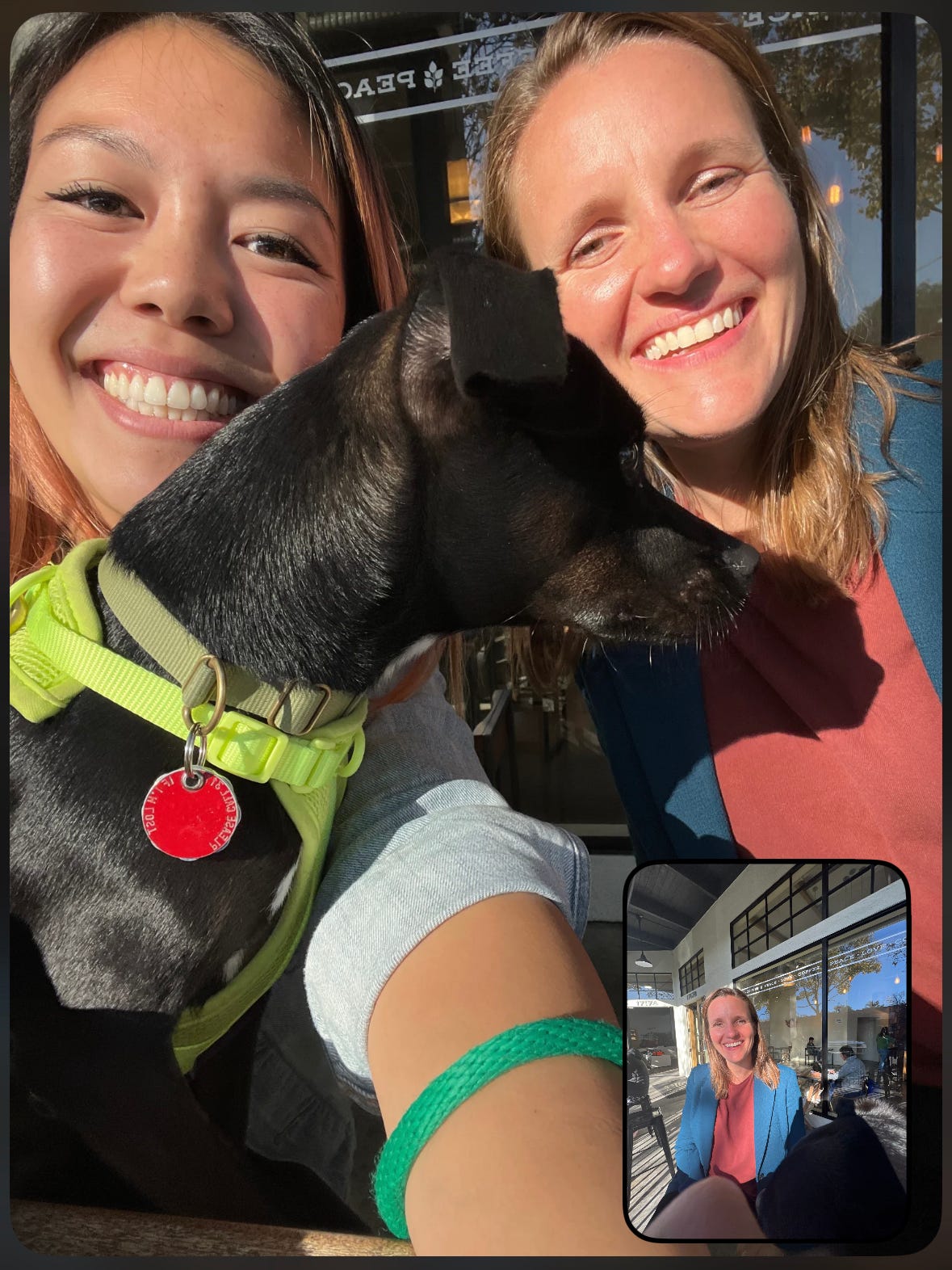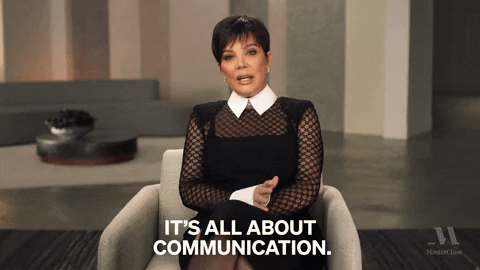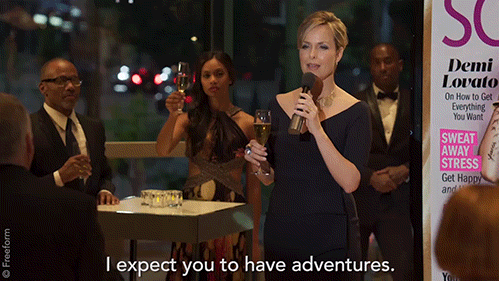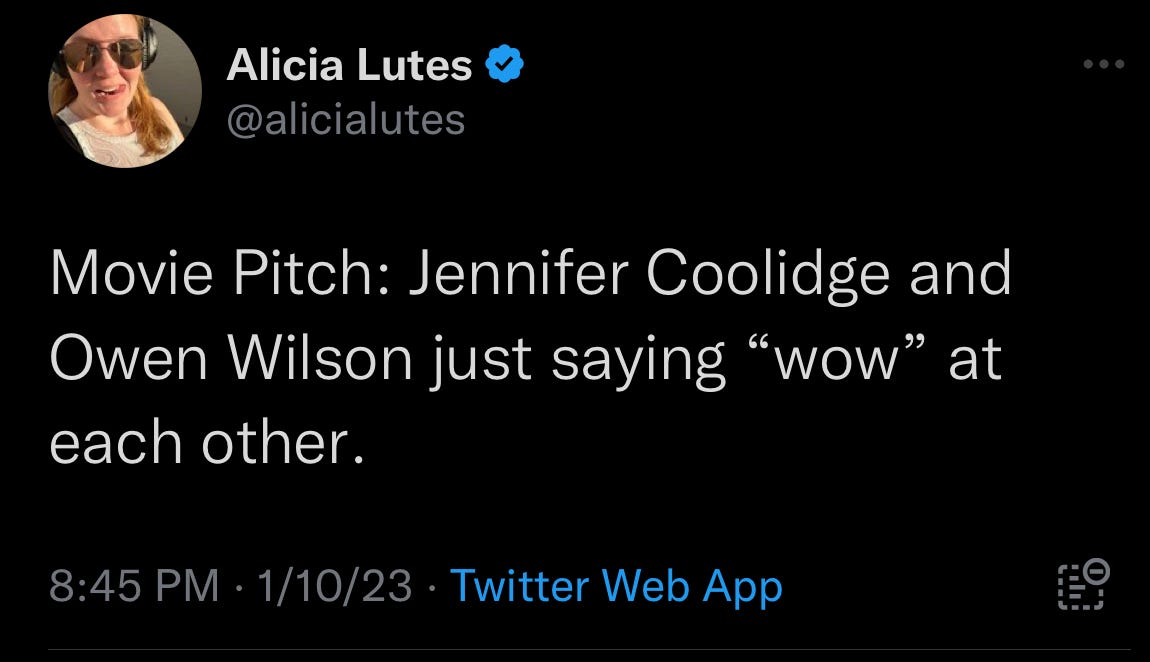The Art of the Mentor
I interviewed my own mentor about why mentorship matters. Here's what she had to say.
If you’re not watching Abbott Elementary, what are you even doing?
Floor Time
/flôr tīm/
noun
the 15-60 minute time period spent laying on the floor in the middle of the work day, typically as a relief from the soul-sucking reality of corporate America.
It’s a new year and I’m sure many of us are looking at our lives and thinking about what’s next. What goals do we want to achieve? How do we get there? Who can help us? Can I pull off corset tops or is it a no-go? (Okay, I admit that last one might just be a me-problem).
When I inevitably begin to ask myself these types of questions, I lean heavily on my mentor, Abby. I’ve known her since 2014, when I interned for her at a major tech company. From there, we kept in touch, which is why in 2016 she called me up as she was hiring a new team in her new role at a prominent Silicon Valley non-profit foundation. Without any hesitation, I took the interview, and within two weeks I was in my new role with Abby as my direct manager.
I feel undeniably grateful that Abby is both my mentor of nearly nine years, and one of my dearest friends. Sometime late last year, I began to talk to some of my peers about the mentors in their life. And I was surprised to find out that my relationship with Abby is more rare than I realized—a lot of people at my level have not found mentors they feel transcend jobs, moves, and other major life changes. It got me thinking about how much mentorship has made a difference in the trajectory of my life, and I decided that it was time to speak to someone who understands mentorship on an incredibly deep level: my own mentor, Abby!
A quick intro for Abby: she was a Marketing Manager for Yahoo!, a Director of Product at Zynga, and the VP of Programs at the Sheryl Sandberg & Dave Goldberg Family Foundation. She is currently a Master’s student in Counseling Psychology (read: she’s. so. cool). Abby has given me permission to share our conversation on mentorship with you below. I hope you feel as inspired by her words as I do. Maybe you’ll even start to lean into relationships that could evolve into mentorships because everyone deserves to have their own Abby. Trust me. She’s awesome.
Having a mentor means finding a safe place to vocalize hopes and dreams that you may be questioning.
CC: So we’ve actually never explicitly talked about mentorship even though you’ve been my mentor for almost nine years! This will be fun. Let’s get right into it. Why is it important to have a mentor?
AS: When you create relationships with people who you think see you and your potential, it can be very energizing. It’s funny, I actually don’t have a mentor, but I’ve witnessed other people seek out mentorship in amazing ways. Having a mentor means finding a safe place to vocalize hopes and dreams that you may be questioning. Your mentor should know you well enough to be real with you, but can also see the next evolution of you and nudge you towards that.
CC: I never realized you don’t have a direct mentor! How did you learn to be a mentor when you yourself didn’t have one?
AS: I didn’t have one specific person I would call my mentor, but I had really great bosses and bosses’ bosses. In my past roles, there have always been trusted confidantes and advisors who I could also lean on. That’s worked well for me, but in my current career change, I am really hoping to find true mentors in this new field.
CC: What does being a mentor mean to you?
AS: I never planned to be a mentor, I don’t think anyone does. I feel like you, [Clarice], sneakily made me a mentor. I loved having you as my intern and snatched you for the next role after college because I knew that you were somebody that I really believed in, trusted, and loved working with*—that’s 80% of working with people, and the rest you learn along the way.
You were the one that took it to the next level. You confided in me and asked my POV about the choices you were making in and out of work. I loved that relationship. You keep me in the loop if you’re thinking about a big change and you are genuinely interested in what I think about it. I think people look to their mentors to get validation and reassurance when they’re doing scary and risky things. As a mentor, I’m able to see it all more clearly because it’s not my life. It’s easy for me to look at you as my mentee and say, “yeah it’s time for you to do this thing you’ve never done before, and you’ll figure the rest out.” Our relationship is having the closeness of understanding but the distance of experience, where I can be steady for you in the moments that don’t feel steady.
*Me, Clarice, blushing heavily through all of this 🥺
CC: You’ve sort of touched on the most rewarding parts of mentorship, but what do you think is the hardest part of being a mentor?
AS: There isn’t one thing that I would point to as hard, but honestly I felt most constricted when I was your literal manager. When you’re managing someone, your job is to help that person succeed and grow but also ensure that they’re delivering for the larger org, and that’s not always in line with what you think is their truest potential. So it was more limiting back then when I had to think about your success at the foundation as opposed to your success in the world. That isn’t to say that we didn’t talk about the world outside work, but it wasn’t as prominent.
CC: I don’t mean to put words in your mouth, so would love for you to clarify: Are you recommending that people seek out mentors outside of their direct manager?
AS: If you have an amazing manager, by all means hang onto that person even after you’re not working together—your relationship might get even better. That was my experience.
CC: I commonly hear from my peers that they just don’t know how to find a mentor. Do you have advice for people who are seeking mentorship but don't know where to look?
AS: It’s such a personal thing to find a mentor. I would ask yourself, “Where do I feel like there’s someone who has something more to offer me—whether it be experience, power, or perspective—but who also sees me?” You’re not even necessarily looking for the person who has the job you want, because that person may not give you the type of guidance you need. They may help you climb to the next rung of the ladder, but it’s not as fun and rewarding as finding the person who just understands who you are as a human. When it’s authentic and real, it’s not transactional. And because of that, remember that you don’t have to apologize for using someone’s time. On the mentor’s side, there’s also value in hearing about your wins and about the ways your relationship has made a difference.
I’ve found that the best thing for fostering mentorship relationships is to feed the important stuff back to your mentor. Let them know that your conversations matter. Say, “I thought about what you said and did the thing. I’m proud of that, and wanted you to know.”
Know that there is imposter syndrome in mentorship, too. Every time I say “mentor,” I feel a little sentient body. It’s easy to get off a call and think, I kinda just talked to them and hope that it was useful, so it really makes a difference to hear the real impact. It makes me want to talk to you about your progress again in the future.
Work is like a liquid and it seeps in wherever there’s space—that’s why establishing boundaries matters.
CC: Keeping in the corporate-ish spirit of Floor Time, I want to pivot to the broader topic of work and the “ultimate question”: how have you found success with work/life balance?
AS: One of the most important things I’ve learned throughout my career is: There is not a finite amount of work to be done. You can always get more. I am a very efficient and productive person, and I love to cross things off the list. It’s very easy for me to fall into this pattern of orienting towards that goal, with the false assumption that if I get things done quicker, I’ll be ahead of the game. I used to be in this pattern of getting up early to do work before work. What ended up happening is realizing that I can just work faster and take on more, which in turn resulted in a vicious cycle of remaining behind.
Work is like a liquid and it seeps in wherever there’s space—that’s why establishing boundaries matters. If you’re chasing the exhalation of relief when you finish a task, know that that doesn’t exist. You can always devote more time. Let go of the illusion of I feel that I got it all done and go live your life instead.
There’s growth and beauty for everyone in the equation when we express ourselves freely. People like to connect and help, and we don’t need this strange wall up that prevents us from exploring that.
CC: It’s clear that you learned a lot on your own, but is there anything you wish someone had told you (whether it be a mentor, peer, or friend) when you were starting your career?
AS: I wish people would’ve told me that I should keep an eye out for people I feel seen and energized by, and build relationships with them. I got advice about work/life balance from one of my first managers but it didn’t make a difference because I was going to work how I was used to working. But seeking out lasting mentorships, that’s something I am starting to look for in this new part of my career.
I’m breaking this pattern a little now that I’m back in school, but historically before asking a question, I would turn it over in my head and make sure I couldn’t get the answer myself. There were so many layers of self-monitoring before I would ask something I’m curious about. I set such a high bar with so much vigilance around that. And it comes from a belief that I’m taking—that talking and asking are taking. I think this is a common misconception in women in particular. Being on the other side of mentorship now, I know it’s not taking—the relationship is mutually beneficial. There’s growth and beauty for everyone in the equation when we express ourselves freely. People like to connect and help, and we don’t need this strange wall up that prevents us from exploring that. Believe in yourself and trust that other people will too. It may feel weird to talk about self-belief in a career context, but that would’ve impacted the way I showed up earlier in my career.
You make choices and you get value out of the experiences the choices bring you, even if the value is learning that it’s not something you want to do. Trust yourself enough to know that if you’re not happy with the way the step plays out, you’ll take another step.
CC: With your mentor hat on, what would you tell someone who is stuck and trying to find their way?
AS You’re in good company. Everyone has been there and you’re probably paying attention if you’re having those questions. Good for you for not being on autopilot.
I also want to go back to the question of, who sees you? Who knows you well enough to imagine the next step with you? Go towards those people. And remember, you’re just taking a step. When I talk to young people in my life, a lot of times they feel stuck because they’re worrying about the next ten years. But it’s a step. Your path will zig-zag. When I’ve found myself in those tricky spots, I’ve talked to people I trust, journaled to get clear on my own thoughts, and asked myself, “What experience feels like I’ll never get it again vs. what can I revisit again in five years?” That’s how I’ve made most of my career choices.
If you feel like you don’t have choices, I’d recommend finding a step even if it doesn’t feel like the step you want to take. Go with grace and flexibility—remind yourself that the step isn’t permanent and progress may look different from what you imagined.
I’ve never had a conversation with someone who has said, “boy, I made the wrong choice.” You make choices and you get value out of the experiences the choices bring you, even if the value is learning that it’s not something you want to do. Trust yourself enough to know that if you’re not happy with the way the step plays out, you’ll take another step.
Last thing I’ll say about this: If you’re feeling stuck, don’t buy the bullshit that you’re part of a family and that you have to sacrifice yourself at the expense of your job. The reality is you can get fired and laid off at any time and they won’t hold your hand through it. You can love your coworkers and build meaningful relationships, but it is a job, and things happen like economic downturns, budget and headcount changes, etc. Even the most responsible and loving leaders have to change their workforce. Don’t lose yourself in a job because work won’t love you back.
Something Pretty
Been listening to Stephen Fry’s Harry Potter audiobooks my sister gave me during Christmas. They spark SO much joy and also just make me miss London. Here’s a throwback pic to #sabbatiCLO.
Something To Laugh About
We’re all optimists here. This is just one example.
I had like four of these this week. What about you?
This is e l i t e humor.
This is also my brand of humor.
Are you now sensing a trend with what I find humorous? Cause this.
Man, I miss Costco. This is cheugy in the most perfect way.
Oops. It me. The girls who get this, get it.
ICYMI, disgraced founder Sam Bankman-Fried isn’t the only one who launched a Substack—I’m also here! Hoping to stay trendy and relevant with the kids, y’know? It’s my first time using anything other than Mailchimp so please excuse any sending or formatting errors—we’re learning and growing here, people.
Thank you all for reading, and special thanks to Abby for taking the time to share a morsel of her infinite wisdom with all of us! May we all be so lucky to find a mentor as magical as she is.
Til’ next time, peers. Your friend,
Clarice














